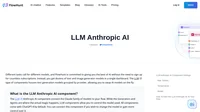What is Cognitive Computing?
Cognitive computing represents a transformative technology model that simulates human thought processes in complex scenarios. It integrates artificial intelligence (AI) and signal processing to replicate human cognition, setting it apart from traditional computing systems that execute defined instructions. Cognitive computing systems are designed to enhance decision-making by processing vast quantities of structured and unstructured data, recognizing patterns, understanding natural language, and making insightful decisions. They are adaptive, interactive, iterative, and contextual, enabling dynamic interaction and continuous learning from new data.
Detailed Insights on Cognitive Computing:
- Cognitive Science Influence: Cognitive computing platforms are deeply influenced by cognitive science, reflecting the intricate processes of human reasoning, perception, and learning. This involves the integration of technologies like machine learning, neural networks, and natural language processing (NLP) to simulate cognitive functions such as deduction, perception, and reasoning.
- Capabilities and Technologies: Key capabilities of cognitive computing systems include machine learning, reasoning, NLP, speech and vision recognition, and human-computer interaction (HCI). These systems are adept at processing both structured and unstructured data, allowing them to interpret complex datasets and derive actionable insights.
- Business Benefits: Cognitive computing offers significant business benefits, including improved data collection and interpretation, troubleshooting and error detection, informed decision-making, and enhanced customer retention. By analyzing patterns and applying machine learning, cognitive systems can enhance visibility into internal processes and customer interactions.
Key Components of Cognitive Computing
1. Cognitive Computing Systems
Cognitive computing systems are specialized AI systems that simulate human thought processes. These systems leverage various AI technologies, including machine learning, neural networks, and NLP, to interpret and analyze data. By doing so, they can process large volumes of data and provide insights beyond human capabilities.
- Machine Learning: This involves algorithms that enable systems to learn from data and improve over time. It is a core component that allows cognitive systems to adapt and refine their decision-making processes.
- Neural Networks: Inspired by the human brain, neural networks are computational models that form the backbone of cognitive computing systems. They are effective in pattern recognition, data classification, and making predictions.
- Natural Language Processing (NLP): NLP allows cognitive systems to understand and interpret human language, facilitating natural and intuitive interactions with users. This is crucial for applications such as sentiment analysis, language translation, and chatbots.
2. Structured and Unstructured Data Processing
Cognitive computing systems excel in processing both structured data (organized and easily searchable) and unstructured data (such as text, images, and videos). This capability enables them to extract valuable insights from diverse datasets, making them applicable in fields such as healthcare, finance, and more.
How Cognitive Computing Works
Cognitive computing systems use a combination of AI technologies to simulate human cognition. These systems employ self-learning algorithms, data mining, and pattern recognition to analyze data and make informed decisions. The ability to adapt and learn from new data allows cognitive systems to refine their models and improve accuracy over time.
Key Attributes of Cognitive Systems:
- Adaptive: These systems can adjust to changes in data and environments, continuously learning from new information.
- Interactive: Human-computer interaction is integral, enabling users to define needs and interact with systems naturally.
- Iterative and Stateful: Cognitive systems can ask questions and gather additional data for problem-solving, retaining information from previous interactions.
- Contextual: Understanding context, such as syntax and domain, helps these systems provide relevant insights and solutions.
Applications of Cognitive Computing
1. Healthcare
Cognitive computing is revolutionizing healthcare by assisting in diagnostics, treatment planning, and patient management. These systems analyze vast amounts of medical data, including patient histories and medical literature, to aid healthcare providers in making more accurate and personalized treatment decisions.
2. Finance
In the finance sector, cognitive computing systems analyze market trends and client data to assess investment risks and detect fraudulent activities. By providing insights into customer behavior and market dynamics, these systems enable financial institutions to make more informed decisions.
3. Retail and Customer Service
Retailers use cognitive computing to enhance customer experiences by providing personalized recommendations and improving customer service. Cognitive systems analyze customer data to offer tailored product suggestions and streamline customer interactions through intelligent chatbots.
4. Manufacturing
Cognitive computing supports manufacturing processes by optimizing production, predicting maintenance needs, and managing inventory. These systems enhance efficiency and reduce downtime, contributing to improved operational performance.
Benefits of Cognitive Computing
1. Analytical Accuracy
Cognitive computing systems excel in processing and analyzing diverse data types, leading to more accurate insights and predictions. This capability is essential in fields such as healthcare and finance, where accurate data analysis is crucial.
2. Business Process Efficiency
By automating routine tasks and providing data-driven insights, cognitive computing systems enhance business process efficiency. Organizations can allocate resources more effectively and focus on strategic initiatives.
3. Enhanced Decision-Making
Cognitive systems provide decision-makers with relevant information and insights, facilitating informed and strategic decision-making. This is particularly valuable in complex and data-intensive environments.
4. Improved Customer Interaction
By understanding and interpreting customer data, cognitive computing systems enhance customer interactions, leading to better customer experiences and increased satisfaction.
Challenges and Risks of Cognitive Computing
1. Security and Privacy Concerns
The reliance on large datasets in cognitive computing raises concerns about data privacy and security. Organizations must implement robust measures to protect sensitive information from potential breaches.
2. Complexity and Integration
Implementing cognitive computing solutions can be complex and may require significant integration with existing systems. Organizations need skilled teams to develop and maintain these systems effectively.
3. Bias and Ethical Issues
Cognitive systems can inherit biases present in training data, leading to discriminatory outcomes. Ensuring fairness and transparency in cognitive computing models is critical to address ethical concerns.
4. Sustainability and Environmental Impact
The energy-intensive training of cognitive systems and neural networks contributes to a significant carbon footprint. Developing sustainable practices and technologies is essential to mitigate environmental impact.
Cognitive Computing vs. Artificial Intelligence
While cognitive computing and AI are often used interchangeably, they have distinct differences. Cognitive computing focuses on simulating human cognition to assist in decision-making, while AI encompasses a broader range of technologies aimed at automating tasks and processes. Cognitive computing is designed to augment human capabilities, whereas AI seeks to perform tasks independently.
Future of Cognitive Computing
The future of cognitive computing holds immense potential for transformative advancements across various sectors. As technology evolves, cognitive computing is expected to play a pivotal role in shaping business operations, healthcare delivery, and human-computer interactions. The integration of emerging technologies like 5G and IoT will further enhance real-time decision-making capabilities, leading to more responsive and intelligent systems.
Data-backed Content With No Fluff
Create data-driven content with FlowHunt’s AI tools. From idea generation to editing, streamline your process for engaging, SEO-optimized results!
Practical AI Courses for your team
Of course! Please provide the content of the webpage you'd like me to summarize into a meta description.
Let AI Take The Guesswork Out of SEO
Boost your SEO with FlowHunt's AI tools! Research keywords, analyze competitors, create briefs & optimize content effortlessly. Try now!"



